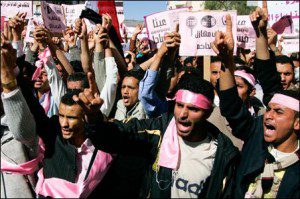Index relies entirely on the support of donors and readers to do its work.
Help us keep amplifying censored voices today.
 After a year of political unrest following the Arab Spring, Iona Craig reports on the current situation in Yemen.
After a year of political unrest following the Arab Spring, Iona Craig reports on the current situation in Yemen.
(more…)
 In post-revolution Egypt, street art has become one of the symbols of ongoing resistance. Yasmine El Rashidi reports on the graffiti artists of Cairo (more…)
In post-revolution Egypt, street art has become one of the symbols of ongoing resistance. Yasmine El Rashidi reports on the graffiti artists of Cairo (more…)
Egypt’s ruling military council decided on 18 August to drop charges against high-profile activists Asmaa Mahfouz and Louai Nagati. The two had been charged with “insulting” and “defaming” the military after posting their personal views (which were critical of military policies) on the social networking sites Facebook and Twitter.
A statement posted on the military council’s Facebook page on Thursday night declared that the two activists “were pardoned because they were in a revolutionary mood that had affected their actions.”
The announcement followed a public outcry and growing demands that the military stop the trials of civilians in martial courts.
After being investigated for three hours by the military prosecutor last Sunday, a tearful Mahfouz was released on a 20,000 LE bail, which was paid on her behalf by other activists. A date for her trial was set for a later date. Throughout the investigations, Mahfouz remained vigilant, and posted another message of defiance on her Facebook page afterwards: “After what I have seen and heard today, I will continue on the same track. Down with military rule!”
But that was before she’d received the good news. Hossam Eissa, her lawyer who had offered his services free of charge, welcomed the decision to free Mahfouz, calling it “a good start”. He added that he would thank the Military Council publicly.
Many Egyptians rejoiced at the news, especially since Mahfouz was one of the key organisers of the January 25 uprisings that brought down former dictator Hosni Mubarak.
Rasha Abdulla, Professor of Mass Communication at the American University in Cairo, was glad to hear of Mahfouz’s release. Abdulla opposes the usage of military trials for civilians, and views them as “a serious violation of civilians’ rights.” She also expressed hope that the move “would usher in a new atmosphere of greater civil liberties and freedom of expression.”
Meanwhile, technology- savvy Egyptians used social media to share the good news and congratulate each other on what many saw as “another victory brought about by people power.”
It was clear, they wrote, that the interim military rulers had caved in under pressure, especially as the revolutionary forces had threatened to organise fresh protests to decry the repressive measures being used to silence voices of dissent. A cynical few, however, suggested that the council may have bowed under international rather than domestic pressure, implying that US interference was behind the military rulers’ change of heart. New US Ambassador Anne Patterson had met privately with Field Marshall Hussein Tantawi, Head of the Military Council, last week to hand in her credentials.
She had pledged the United States’ full support for Egypt as the country makes the democratic transition.
“What matters, however, is that the council is rethinking its repressive policies,” one Facebook user argued.
Presidential hopefuls Mohamed el Baradei and Amr Moussa, and leaders of political parties had earlier joined the chorus of condemnation, possibly seeing the standoff between the military council and the revolutionary forces as an opportunity to widen their popularity. The Muslim Brotherhood, which had previously guarded against losing favor with the interim military rulers, also expressed its rejection of martial courts for trying civilians. Hafez Abou Ismail, the presidential candidate for the Salafists meanwhile drew a comparison between military trials for civilians and those of Mubarak’s corrupt former regime members in civilian courts.
Skeptics took the military’s latest announcement with a grain of salt. They cautioned that the military statement on Facebook carried a veiled threat and urged users of the social media network to “read carefully between the lines.”
The military council, they noted, had called on journalists and intellectuals ” to be careful in expressing their viewpoints and to voice them responsibly in a manner that would not be offensive.”
“What would happen then to those whose opinions are considered offensive? ” they asked.
General Mamdouh Shaheen, the spokesperson for the military council has made it clear that offenders will be dealt with firmly. Appearing on Al Jazeera from Egypt, he reiterated that military trials would be reserved solely for thugs, criminals and drug dealers. But he did try to evade questions about what would be considered “offensive” by the military council. He also insisted that a three year jail sentence for blogger Maikel Nabil was not a disproportionate punishment. Nabil’s only crime was “criticising” the military council in a blog post.
While the pardoning of Mahfouz and Nagati is a welcome step in the right direction, Egypt has yet to see the release of Nabil and more than ten thousand other activists still languishing in prisons after facing hasty military trials in the post-revolution period. Their liberation, many say, will be the “real” gesture of goodwill that would help restore faith in the military.
Journalist and television anchor Shahira Amin resigned her post as deputy head of state-run Nile TV on February. Read why she resigned from the “propaganda machine” here.
Six months after tens of thousands of opposition activists staged peaceful protests in Tahrir Square forcing longtime dictator Hosni Mubarak to step down, the Egyptian revolution finds itself at a “dangerous curve”. The demands made by the pro-democracy activists during eighteen days of mass uprisings remain largely unfulfilled and analysts have expressed concerns that the revolution is losing steam and that urgent action is needed to salvage it.
“The old regime — still very much intact — is preparing to deal a fatal blow to the revolution,” warns writer Alaa Aswany.
He notes that the police force has yet to be purged of officers responsible for torture during the Mubarak-era, adding that the judges who supervised the November 2010 parliamentary election— which was rigged and flawed — remain in their positions.
The sooner power is handed over to a civil government the better, he advises, as only through elections can the revolution be salvaged.
Most Egyptians celebrated throughout the night on 11 February when state television finally broadcast the annoucement that Mubarak was stepping down after eighteen days of largely peaceful protests. The pro-democracy activists who brought down the former government had yearned for freedom, social justice , an end to police brutality and to rampant corruption. But that was then. Now, six months later, Egyptians are growing increasingly frustrated at the lack of progress and the marked deterioration in their living conditions. Many are pointing the finger for the current state of affairs at the pro- democracy activists and at the revolution itself.
“What have we achieved?” asked Mohamed Helmy, a 48 year old taxi driver as we waded through Cairo’s heavy rush hour traffic. “Look around you : Everything is exactly the same — except our livelihoods have been destroyed.”
The complaint has become commonplace in recent weeks with an increasing number of Egyptians bemoaning the increased thuggery, the lapse in security, the soaring prices of food and basic commodities, and the continued strikes at state institutions that, many say, are disrupting their lives.
“Ramadan used to be a festive time of year,” says Amal Mahmoud, a 32 year old housewife. “This year, the mood is somber. Most of us cannot afford to buy many of the basic necessities let alone the traditional Khoshaf (a Ramadan delicacy consisting of dried fruits and nuts) and we no longer feel safe on the streets.”
In the populous district of Al Hussein, scores of underprivileged citizens flock early to book their seats at the Tables of Mercy set up on street corners by the wealthy as a form of zakat (alms giving) to ensure that no-one goes hungry during the fasting month.
In the nearby cafes lining the alleys of the adjacent Khan el Khalili bazaar (usually teeming with tourists), the evening clientele is made up of local shop owners taking time off from their quiet businesses to smoke water pipes after the Iftar meal. Unlike in previous years, when the conversation was generally light-hearted and dominated by people’s analysis of the latest Ramadan TV serials, the discussions are now serious and revolve around what many describe as “the dismal conditions.” The mood is heavy as café goers share their economic and political concerns.
“Business is slower than it’s ever been,” complains Haj Ali Farrag, who owns a tiny bazaar selling trinkets and souvenirs. “ People are afraid to go out because they read in the papers about the increased crime rate. Things cannot continue this way for long,” he says as he shakes his head in dismay.
Intense media focus on the security, economic and social challenges in recent weeks has led some to believe that the problems are intentionally being overblown in an apparent bid to turn the public against the revolution.
“This is the same state media that lied to the public during the revolution calling the opposition activists ‘traitors’ and ‘foreign agents’. ‘Now they are doing it again. The aim of their latest smear campaign is to terrorise the public and convince people that the revolution is behind their woes” is the explanation offered by Ahmed Mourad, an Arabic teacher and activist. And their tactics are working, he laments.
Mourad adds that the latest media campaign has succeeded in creating a rift between the pro-democracy activists and a public that has grown tired of the upheavals and is eager for a quick return to a state of normalcy. He reminds me that when peaceful protesters attempted to march to the Defence Ministry in Abbaseya on the anniversary of the 23 July 1952 revolution to protest the slow pace of reforms, they had come under fierce attack.
And it was the knife-wielding residents of the district that had pelted them with stones and bottles as military police stood by watching. The scene was repeated when riot police and soldiers armed with electrified batons stormed Tahrir Square on the first day of Ramadan to forcibly remove dozens of activists (including relatives of the martyrs killed in the uprisings) who had continued to camp out in the Square to pile pressure on the transitional government to respond to the revolution’s demands. Again, ordinary citizens had volunteered to help chase away the holdout activists.
“It is clear the armed forces are creating divisions to consolidate their power. They have succeeded in pitting Egyptians against fellow countrymen,” Mourad says.
While his theory appears to ring true, there are those who choose to remain optimistic against all odds.
“It is important that we remain upbeat and not to lose sight of the ultimate goal — which has to be a fast transition to a civil government.
We must hold the military rulers to their promise of holding elections in November and concentrate on preparing for a free and fair vote. This has to be our priority at this time,” insists Ghada Farouk, another activist.
Recent developments, however, do not auger well for the future. Sunday’s postponement of the trial of former Interior Minister Habib El Adly — accused of ordering the killing of around 850 protesters during the mass uprisings — and the interrogation of activist and blogger Asmaa Mahfouz by the military prosecutor for allegedly “defaming the military” on Facebook signal a backward slide and fuel concerns that the road ahead is likely to be bumpy.
Journalist and television anchor Shahira Amin resigned her post as deputy head of state-run Nile TV on February. Read why she resigned from the “propaganda machine” here.